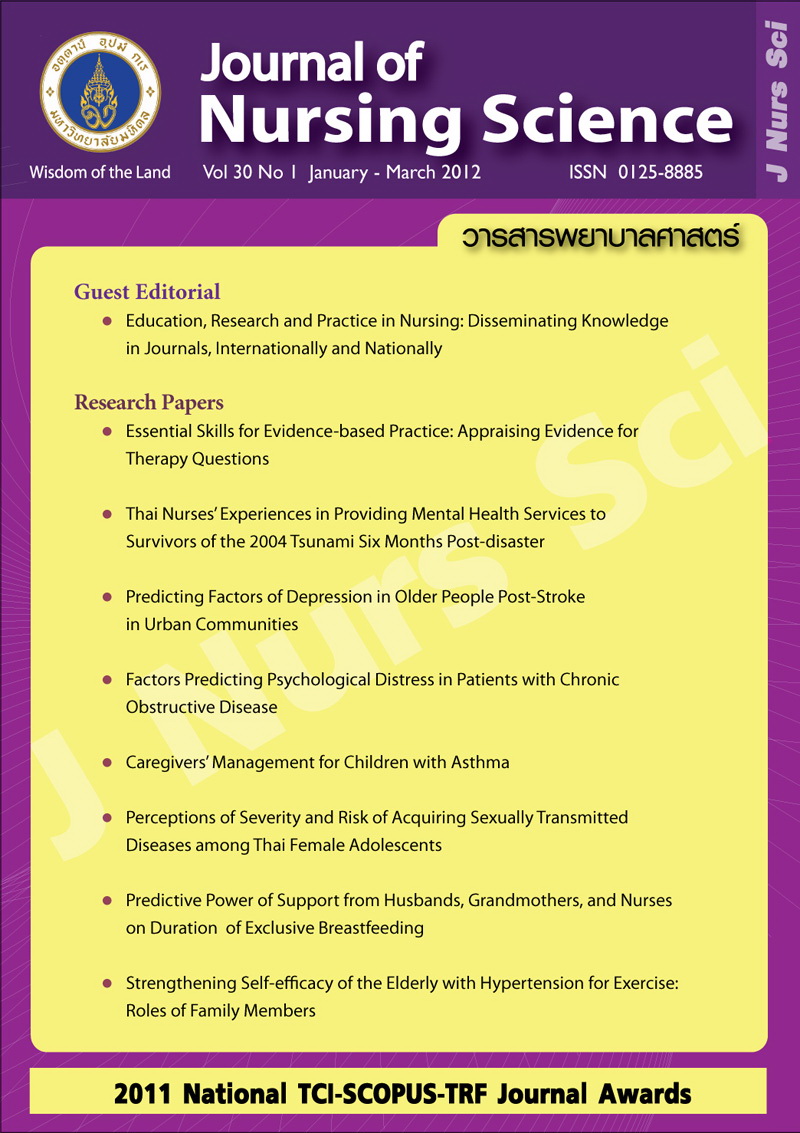Thai Nurses’ Experiences in Providing Mental Health Services to Survivors of the 2004 Tsunami Six Months Post-disaster
Main Article Content
Abstract
Purpose: This research explored Thai nurses’ experiences in providing mental health services sixmonths after the 2004 tsunami disaster, and their perspectives of factors that promoted and impededservices in the affected areas working in Phungha Province.
Design: A qualitative research design was employed.
Methods: Information was obtained from 16 nurses who had worked at a variety of health servicecenters. Data were collected by conducting 2 focus groups and 10 in-depth individual interviews, andanalysed by content analysis.
Main findings: Five themes were emerged. The first related to care during the crisis phase: Be afriend to face with struggle, helping to manage forthcoming problems, and being supportive. Themestwo, three and four related to management of mental health services: Informing people in thecommunity, so that individuals with stress were discovered; Working as a bridge, lack of participation;and Working separately, no collaboration, lots of confusion. The last theme related to mental healthservice providers: When the sky became bright, health care personnel became exhausted. Keypromoting factors of mental health services included having nurses to be responsible for providingmental health services in affected areas; having strong community networking and health volunteers;and learning management strategies from other areas. On the other hand, impeding factors for mentalhealth services included a lack of systematic management and having large numbers of survivors livingin the same areas.
Conclusions and recommendations: The findings suggest a plan for psychological assistance ofsurvivors of the disaster by having community participation as well as a plan for systematic managementof the people in the affected areas.
Article Details
Copyright Notice: Nursing Science Journal of Thailand has exclusive rights to publish and distribute the manuscript and all contents therein. Without the journal’s permission, the dissemination of the manuscript in another journal or online, and the reproduction of the manuscript for non-educational purpose are prohibited.

Disclaimer: The opinion expressed and figures provided in this journal, NSJT, are the sole responsibility of the authors. The editorial board bears no responsibility in this regard.
References
Committees of national disaster prevention and mitigation. Plan of National Disaster Prevention and Mitigation B.E. 2010-2014 [Database on the Internet]. [cited 2011 Oct 13]. Available from: http://www.disaster.go.th/ dpm/users/files/plan/plan002.pdf
Punyayong B. Trace back tsunami. Phunghha Province: Mental Health Recovery Center; 2006. (in Thai).
Griensven FV, Chakkraband S, Thienkrua W, et al. Mental Health Problems among Adults in Tsunami-affected areas in Southern Thailand. JAMA. 2006;296:537-48.
Everly GS, Hamilton SE, Tyiska CG, Ellers K. Mental health response to disaster: consensus recommendations: Early Psychological Intervention Subcommittee (EPI), National Volunteer Organizations Active in Disaster (NVOAD). Aggress Violent Beh.
;13:407-12.
Ehrenreich, JH. Coping with disasters: A guidebook to psychosocial intervention, Available from: URL: http://www.mhwwb.org
Utit P. translator; Ehrenreich JH, Coping with disasters: A guidebook to psychosocial intervention. Revised ed. Bangkok: WHO and Chulalongkorn University; 2006. (in Thai).
Turale S. Nurses: are we ready for a disaster? J Nurs Sci. 2010;28(1):8-11.
Supharatit S. Result of survey tidal wave in Thailand. In: Punyayong B, editors. Coming to Mental Health Recovery Center for Tsunami Survivors. Phungpha Province: Beyond Publishing; 2005. p. 42. (in Thai).
Polit DF, Beck CT. Nursing research: generating and assessing evidence for nursing practice. 8th ed. Philadelphia: Wolters Kluwer; 2008.
Yoddumnern-Attig B, Tangchonlatip K. Qualitative analysis: data management, interpretive explanation and finding the meaning. Nakhon Prathom: Institute for
Population and Social Research; 2009. (in Thai).
Marshall, MC. San Antonio Mental Health Disaster Consortium: Hurricanes Katrina and Rita, A Personal Perspective. Perspect Psychiatr C. 2007;43:15-21.
Leskin GA, Huleatt WJ, Herrmann J, LaDue
LR, Gusman FD. Rapid development of family assistance centers. In: Ritchie EC, Watson PJ, Friedman MJ, editors.
Interventions following mass violence and disasters: Strategies for mental health practice. New York: Guilford Press; 2007. p. 257-77.
Young BH, Ford JD, Ruzek JD, Friedman MJ, Gusman FD. Disaster Mental Health Services: A Guidebook for Clinicians and Administrators; 1998 [cited 2007 Sept 5].
Available from: URI:http://ncptsd.va.gov/ ncmain/ncdocs/manuals/nc_ manual_ dmhm.html
Becker, SM. Psychosocial Care for Adult and Child Survivors of the Tsunami Disaster in India. JCAPN. 2007;20:148-55.
Wind LH, Kayser K, Shankar, R. Culture and recovery: Challenges to providing disaster relief after the Tsunami in South India. Journal of Global Social Work Practice
[Internet]. 2009 May-June [cited 2011 Oct
; 2(1). Available from: http://www.globalsocialwork.org/vol2no1_Wind.html
Clukey L. Transformative experiences for Hurricanes Katrina and Rita disaster volunteers. Disasters. 2010;34(3):644-56.
Yang Y-N, Xiao LD, Cheng H-Y, Zhu J-C & Arbon P. Chinese nurses’ experience in the Wenchuan earthquake relief. Int Nurs Rev. 2010;57:217-23.
International Council of Nurses and World Health Organization Western Pacific Region. ICN framework of disaster nursing competencies. Geneva: ICN; 2009:7.
Berah EF, Jones HJ, Valent P. The experience of a mental health team involved in the early phase of a disaster. Aust NZ J Psychiat. 1984;18:354-8.
Bills CB, Levy N, Sharma V, Charney DS, Herbert R, Moline J, Katz CL. Mental Health of workers and volunteers responding to event of 9/11: review of the literature. Mt Sinai J Med. 2008;75:115-27.


